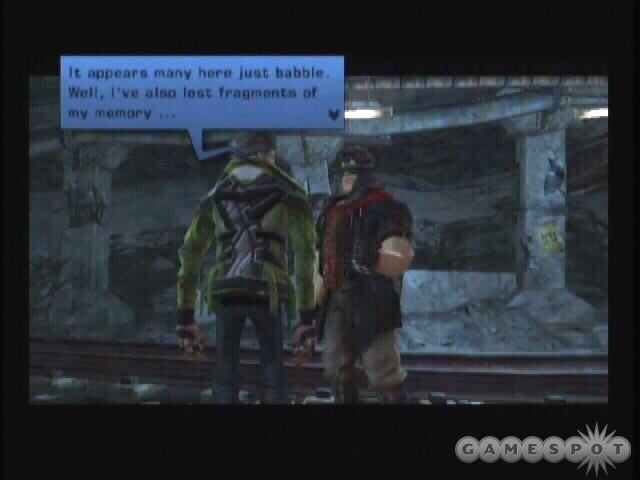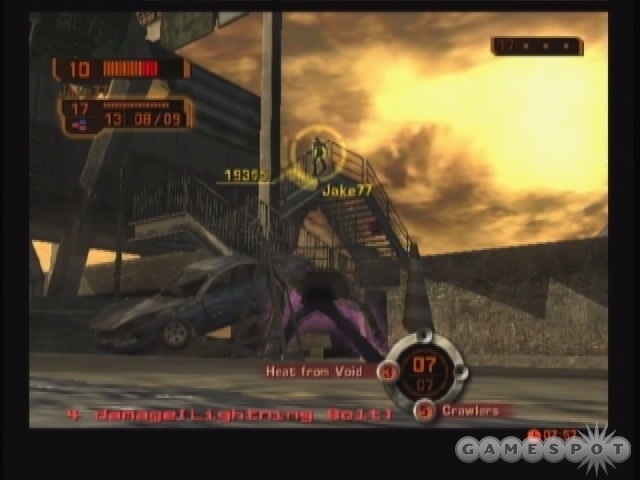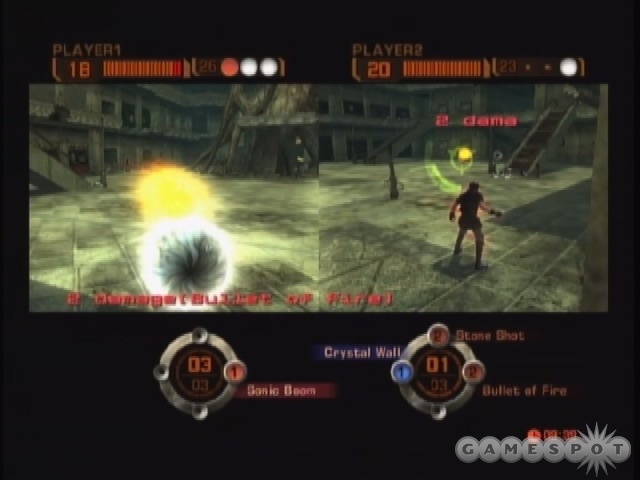Majesco is gaining a reputation for publishing offbeat titles that have been unceremoniously dumped by Microsoft. One eccentric castoff, Double Fine's Psychonauts, arrives in a few weeks. First up, however, is Phantom Dust, an action/strategy hybrid developed by Microsoft Game Studios in Japan, published by Microsoft in Asia, and then abandoned by Microsoft for North American release. Though Microsoft must have had its reasons for dropping it, it's hard to imagine what those reasons could have been. Designed by Panzer Dragoon Saga creator Yukio Futatsugi, Phantom Dust is a unique and terrifically successful blend of strategy, tactics, and fast action. And it's only $20!

Essentially, gameplay is a cross between the deck-building and card-collecting elements of Magic: The Gathering and the controls, speed, and environmental tactics of a shooter. The duels are the meat of the game, where the object is to reduce your opponents' life points to zero before they do the same to you. Movement controls are typical for a third-person action game (left stick moves, right stick adjusts the view), and the duels take place in real time across various shooter-esque 3D environments.
Instead of a traditional complement of weapons, however, you're armed with "skills." You can carry four skills at a time, each one mapped to one of the X, Y, B, and A buttons. You begin a round with four skills that are randomly selected from your "arsenal" (Phantom Dust's term for "deck"), which may include up to 30 skills in total. Three other randomly selected skills from your arsenal also appear as glowing orbs at your starting spot. This is effectively the top of your "draw pile."
By standing on top of an orb and pressing X, Y, B, or A, you replace the skill currently mapped to that button with whatever skill is contained in the orb. The orbs disappear when picked up. After a few seconds, a new skill is randomly pulled from your arsenal, crammed into an orb, and placed back at your starting spot so that you'll generally have three new skills available at any given moment. If you burn through your entire arsenal before the duel ends, your life points begin to drain until you eventually die.
Each skill costs a certain amount of "aura" to activate (think "mana"). The amount of aura you have is determined by your level. A significant part of your arsenal's 30 slots must be devoted to aura particles, which appear out of your arsenal just like skills and are sort of analogous to "land" in Magic. You begin a duel at level 0, but each aura particle that you pick up and use raises your level by one. Your aura depletes as you fire off skills, and it replenishes automatically over time until it reaches your current level.
There are currently 340 skills to collect, and you can do this by either completing missions in the single-player game, buying them with game currency from the in-game store (randomly in booster packs of five or, more expensively, singly by name), or trading with other players on Xbox Live. There are 40 ultrarare skills that can only be claimed by completing various goals (such as winning 30 duels) in multiplayer. Each skill falls into one of five schools. An arsenal can contain skills from only one or two schools (three if you're willing to have your aura-regeneration rate decreased).
The skills--some of which can be used just once and some that can be used over and over again--represent a wide range of offensive and defensive abilities, plus other oddball stuff, such as being able to temporarily fly, erase an opponent's equipped skills, and destroy all of the aura particles in play. One, appropriately called mind reading, even lets you listen in on the opposing team's voice chat. It's an example of how the developers have done a terrific job of making the skills complement a video game rather than simply re-creating a tabletop card game.
In a good collectible card game, you spend as much time thinking about deck design as you do actually playing. With its variety of cleverly designed skill effects, Phantom Dust really nails this deck (sorry, arsenal) design mechanic. When not actively dueling, you'll find yourself daydreaming about possible combos, counters, and potential theme arsenals. It's a game that definitely inspires obsession.

However well designed and balanced the game's skills are, Phantom Dust's genius lies in how well it manages to integrate this system into an action game. The strategy of deck design and the tactics of intelligently using your available skills in battle are combined with a requirement for precise timing that simply couldn't be implemented in a traditional card game. Many defensive skills must be activated just as an attack is about to hit, and many attacks require you to jockey with your opponent for both line of sight and optimal range. Some attacks can be thwarted by manually dodging them or by intervening cover.
Another impressive feature is the use of cover. The game's arenas look great and they're spectacularly destructible, which adds a huge degree of manic craziness to the duels. Hide behind a wall to escape an oncoming fireball and there's a good chance the wall will explode in a satisfying shower of masonry, leaving you open for the next attack. With enough force, you can collapse virtually everything in a level, from pillars to fences to furniture to entire floors and ceilings. Best of all, the effect isn't just cosmetic. With proper timing, you can damage an enemy by burying him under the rubble. This adds a whole other strategic layer to the game, since you have to learn the subtleties of the level layouts as well as master the proper use of the game's skills. In fact, particular skills are better suited to certain environments. For instance, attacks that fire in a parabolic arc don't perform well in arenas with low, nondestructible ceilings.

Unfortunately, after creating an excellent, original gameplay concept, the developers couldn't leave well enough alone. They saddled the roughly 20-hour single-player campaign with way too much pointless storytelling. Rather than simply structure it as some kind of league play, or tournament, or anything that would put the focus of the game squarely on its best part--dueling--they instead wrapped the entire thing in a slow-moving, crusty adventure game mechanic. Between duels, you'll spend an aggravating amount of time in a small base, running back and forth through way too many load screens and repeatedly clicking on the same 12 or so characters in the hopes that they'll unlock the next duel. Instead, the characters usually just pour out their postapocalyptic woes in poorly written word bubbles. On top of this, a solid third of the campaign is essentially a big tutorial. You'll be ready to design your own arsenals long before the game is ready to let you.
Still, once the training wheels come off of the single-player campaign, the dueling action picks up enough so that the lame adventuring isn't a total deal breaker. But, even so, it's a damn shame that all the time spent crafting the story and its various cutscenes wasn't used to implement even more skills, or better yet, more arenas (of which there are only seven, though each one has several variations).
The big nasty wad of plot that the game forces down your throat is also eased a bit by how good everything looks. The environments are busy with neat little details, and are, to a giddy-making extent, destructible. There are also some really cool-looking skies. Considering the amount of skills there are, the effects manage to be varied and impressive. In fact, nothing about the visuals betrays the game's budget price. The soundtrack, much of it remixed orchestral music, is also really terrific. The game even features a surprisingly not-half-bad ending theme song by model, actor, filmmaker, and serial egomaniac Vincent Gallo. There's even a picture of him in the full-color manual.
You'll want to plow through the single-player campaign mainly to collect cards for the multiplayer experience, which is by far the best part of the game. Phantom Dust offers a complete set of Xbox Live features, including quickmatch, optimatch, game search, a skill store, a skill-trading lobby, and a worldwide ranking system. Duels support up to four players at a time in either free-for-all, two versus two, or three versus one. There's also a thorough set of rule modifications available that impose various arsenal restrictions and environmental modifications. You can also play for ante.

Though the artificial intelligence in the single-player game is serviceable for practice, it's obviously nothing like playing a real person. The variety of deck designs and tactics you'll experience online is consistently surprising and should keep the game fresh for a long time. There's already been one update that added some new cards and tweaked others. Hopefully, more content is on the way. You can also play two-player split-screen, which works, but it's slightly crippled, because for some reason the arenas in this mode don't appear to be destructible.
Phantom Dust is an easy game to recommend. Sure, the single-player campaign is a little aggravating, but that's mostly because it offers too much "blah blah blah" between the great dueling parts. Once you delve into the online experience, all will be forgiven. For $20, Phantom Dust is this year's Katamari Damacy--a legitimately excellent and singularly unique game that somehow slipped out at a budget price.